Natalie Portman Is The Woke Actor We Need Right Now
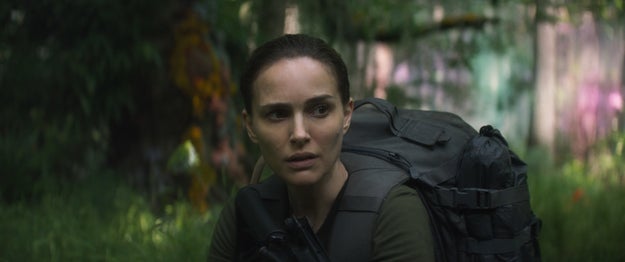
Natalie Portman in Annihilation
Paramount Pictures
Over the course of Natalie Portman’s career, which has spanned nearly a quarter century, she has been in more than 40 movies; won the Best Actress Oscar for her role in 2010's Black Swan; adapted Amos Oz's autobiographical novel A Tale of Love and Darkness, and directed herself in it; served as the face of Dior (and still does); been a vegan activist; had two young children with her husband, Benjamin Millepied; and sent up her demure public image in two aggressively obscene, bleep-filled raps on Saturday Night Live, first in 2006 and again earlier this month ("Say something about the motherfuckin' prequels, bitch!"). She grew up on Long Island and graduated from Harvard (even as she starred in movies), and lived in Paris from 2014 to 2016, but is now back in Los Angeles.
Portman's latest work, Annihilation, comes out on Feb. 23. Written and directed by Ex Machina's Alex Garland (and based on the first novel in Jeff VanderMeer's Southern Reach trilogy), it's a moody, intellectual sci-fi film that is led by a diverse cast of women. Portman plays Lena, a biologist trying to save her husband (Oscar Isaac) who — along with a psychologist (Jennifer Jason Leigh), a paramedic (Gina Rodriguez), and two scientists (Tessa Thompson and Tuva Novotny) — sets off into a possibly extraterrestrial "shimmer" in swampy Florida. It’s called "Area X" and is closed off to the public, and no one has ever returned from it alive other than Lena's now comatose husband. The movie is both cerebral and an edge-of-your-seat, nerve-racking thriller. It also features an ending that will certainly spur WTF speculation.
As a celebrity, Portman, 36, has always kept a low profile. But she has recently emerged as a prominent figure in the Time's Up insurgency, which assembled this fall as the reckoning on sexual assault and harassment in Hollywood gathered momentum. When she announced the Best Director category with Ron Howard at the Golden Globes in January, Portman's factual, simple, yet utterly damning statement, "And here are the all-male nominees," was one of the evening's moments of heroism. In a group interview with Oprah Winfrey and other Time's Up women on CBS Sunday Morning, Portman spoke pointedly about inequality in the workplace: "We're human beings, whether we are related to a man or not. We deserve the same respect." And at the Women's March in Los Angeles last month, Portman recounted in a speech that, at a young age, she "built a reputation for basically being prudish, conservative, nerdy, serious, in an attempt to feel that my body was safe" in reaction to coming of age as an actor in an "environment of sexual terrorism."
During a recent interview, Portman talked to BuzzFeed News about Annihilation, working with a nearly all-female cast, her earlier films, and her impassioned feminist activism.
Annihilation filmed in 2016, and it's certainly a departure from your recent work, like Jackie. What drew you to it?
Natalie Portman: I've been a fan of Alex's writing and, more recently, his directing. When I read the script it was unlike anything I had ever read before. I've never come across some of these questions that he poses, and found it really fascinating the way he connected the interior psychological world of these women with their environment. Which I always think is the best kind of thriller: when the "terrifying thing" is an externalization of your internal state. And of course to have five women at the center of it is just unheard of.

From left: Jennifer Jason Leigh, Natalie Portman, Tuva Novotny, Tessa Thompson, Gina Rodriguez.
Peter Mountain / Peter Mountain
Yes, you're the lead in this ensemble cast that's nearly all women. Did that feel different to you?
NP: Completely different. Usually you're the only actress: You're the girl. And that means you're identified as that. And when there's more than one, they have to define you by your personality! The side effect of being the only woman in the workplace is that you don't get to share experiences with other women. And it's just incredible to see each other work and be able to support and encourage each other and have that camaraderie. It was very, very beautiful. Because we've taken it for granted, being the only woman at work — you forget that it isolates and endangers you. You lose all of those opportunities for hearing things that are going on, for warning each other about certain situations, for telling each other how to deal with an uncomfortable experience. It was really wonderful.
I have a friend who's active in Time's Up, and she told me that there are all these actors there who are meeting each other who are so used to being the only one. Has that been your experience too?
NP: Yeah! What feels so revolutionary for us is daily life for men. Men are used to sitting around a table with all men, men are used to being at work with all men; for us, it feels radical. I've had wonderful male mentorships, wonderful male colleagues — that exists. But we've completely lost female mentorship, and missed out because you just don't get exposed to it as much. It's just rarer because of the lower percentage of women in every position of power.
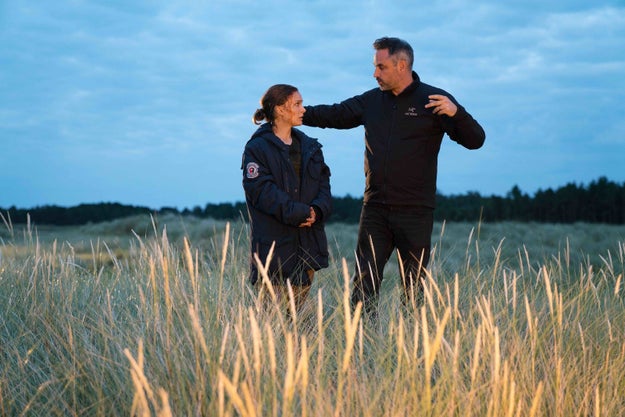
Portman and director Alex Garland on the set of Annihilation.
Photo Credit: Peter Mountain / Peter Mountain
What sorts of conversations did you have with Alex Garland about your character?
NP: He didn't want to be too prescriptive. I think that what was important to him for me was this was a journey through my own demons — I'm trying to not give spoilers. But she's confronting her own behavior and her own actions and what she's done to other people that might be out of line with her personality. Like: Why do we do things that are not in line with the way we say we are, or the way we want to be? How does that change us? How does that mutate us? How does that change other people? This idea that cancer can also be behavioral.
I saw the video of the interview you did during which you found out your character had been whitewashed — that in the second book in Jeff VanderMeer's trilogy, she's identified as being of Asian descent. Now that you know, do you have anything more to say about it? And what did it feel like to find that out during an interview?
NP: Yeah, it felt terrible. This is the thing: There's a very big problem of representation in Hollywood, and I have very strong feelings about it. There's much fewer women onscreen than men, and this movie has so many and I feel so proud of it. And particularly women of color are not seen onscreen — and this movie also has wonderful representations of women of color as well! I feel very strongly about the issue, and there just needs to be more representation, and I would hate to be part of that problem. We based it on the first book, which does not mention race at all.
And it's really unfortunate, and was a surprise to me for sure. And I think we live in a post-Hamilton world where we don't even need to think about what's authentic to the character, like faithful to the character. It should just be that everyone can empathize with everyone. And also going against a horrible history of over-seeing white actors and under-seeing otherized people and minorities.
I take it there was some behind-the-scenes drama between producers on this movie?
NP: I don't know about anything!
I guess David Ellison wanted the ending reshot, and Scott Rudin said no. This was in the Hollywood Reporter.
NP: I don't read it. I don't know anything!
You're answering my question, actually, which was: Were you aware of these fights?
NP: I obviously was not! We did reshoots on the film, so I was obviously aware of that: Some of the interrogation scenes were added.
You've produced movies, and you've also directed. Now that you've done those things, does it feel different when you're an actor for hire in a movie?
NP: Yeah, you appreciate not knowing. Like when you're talking to me about this drama, I'm like, ah, I'm so happy not to know. You can be oblivious, and good producers don't let actors know about any problems. Producers are the problem solvers. With directing, you're responsible for so many things that it's like breadth of knowledge, whereas with acting you can really go for depth. You can have that tunnel vision and just focus on yourself.
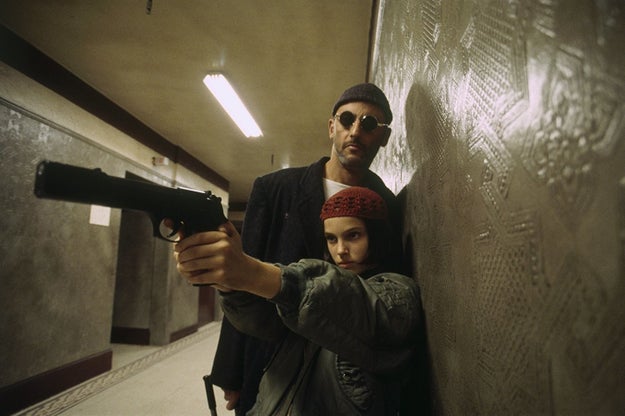
Portman and Jean Reno in The Professional.
Gaumont Buena Vista International
I rewatched a bunch of your movies, and started with The Professional. You were 11 or 12 when you filmed it — how do you look back on that experience?
NP: I turned 12 while I was shooting. I look back on it really fondly. I feel like I was so lucky to be the first thing I got, and I feel like I learned so much getting to watch Luc [Besson] as the first director I got to watch work, and Jean Reno was the first actor I got to watch work. And Gary Oldman. I feel lucky that I had very hovering, protective parents too, because I had a positive, wholesome experience. As wholesome as can be, considering that movie has sexual overtones/undertones, and is also very violent. It really seemed like the most fun time for me.
I read a New York Times interview with you and your mom from 1996. And your mom said she hadn't realized when reading the script how sexualized it was going to be.
NP: Yeah, I think for my parents, it was hard to see it. And there was almost a backlash against them when it came out as if they were irresponsible to let me do it. And it kind of scared all of us into — which I've talked about a little bit — buttoning it up afterward. Which was unfair. I mean, I think you do have a lot of sexuality as a kid, and I definitely had that as part of my essence, I think. And it shouldn't have to be buttoned up. It should be allowed to be expressed and not endanger you.
In the interview, you said this really funny thing about turning down Adrian Lyne's Lolita remake: "Let me tell you, that movie's going to be sleaze. He did 9½ Weeks."
NP: Really? That's hilarious. Oh my god, my big mouth. Everything I was being offered was, like, sexy little girls.
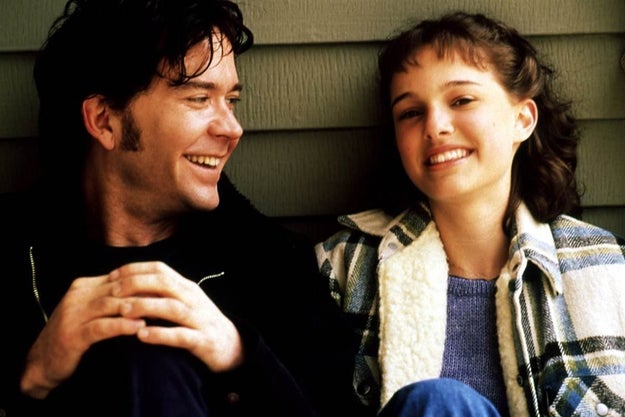
Timothy Hutton and Portman in Beautiful Girls.
Miramax
Speaking of which, it is weird in 2018 to watch Beautiful Girls. You're so good in it! But your character is 13 and Timothy Hutton's character, who is in his twenties, falls in love with you! And tells you you're prettier than his girlfriend!
NP: Yeah. And in retrospect it's weird because so many of the stories around the Weinstein case involve people from Beautiful Girls. I didn't know that all the adult women I was working with who I was admiring so much and felt so cool to get to be in a movie with them were being harassed at the same time. I was, like, the cute little kid on set everyone was treating totally respectfully and kindly.
And I know you've spoken about your personal experiences, and you've said, "I have a hundred stories" —
NP: Yeah, but I have not been assaulted. I don't ever want to equate that, and I would never put it on the same plane as women who have been. Those women are the ones who've been brave coming forward and talking about their experiences.
It seems like we're in a period of recontextualizing things. And revealing things, of course — Rose McGowan, and the other accusers. But also thinking about things in a different context.
NP: Yes! Absolutely. Like we were saying about rewatching those films, and being like, what we thought was charming then is now very troubling.
Does it seem like there was a disgusting veil over everything that's finally being lifted? Sexual assault and harassment, but also equal pay — these are things that were accepted.
NP: There's definitely a devaluing of female voices, and of females in general. That's what connects the pay, the representation, the harassment, the assault — it's a continuum of behavior that's silencing and very violent and devaluing.
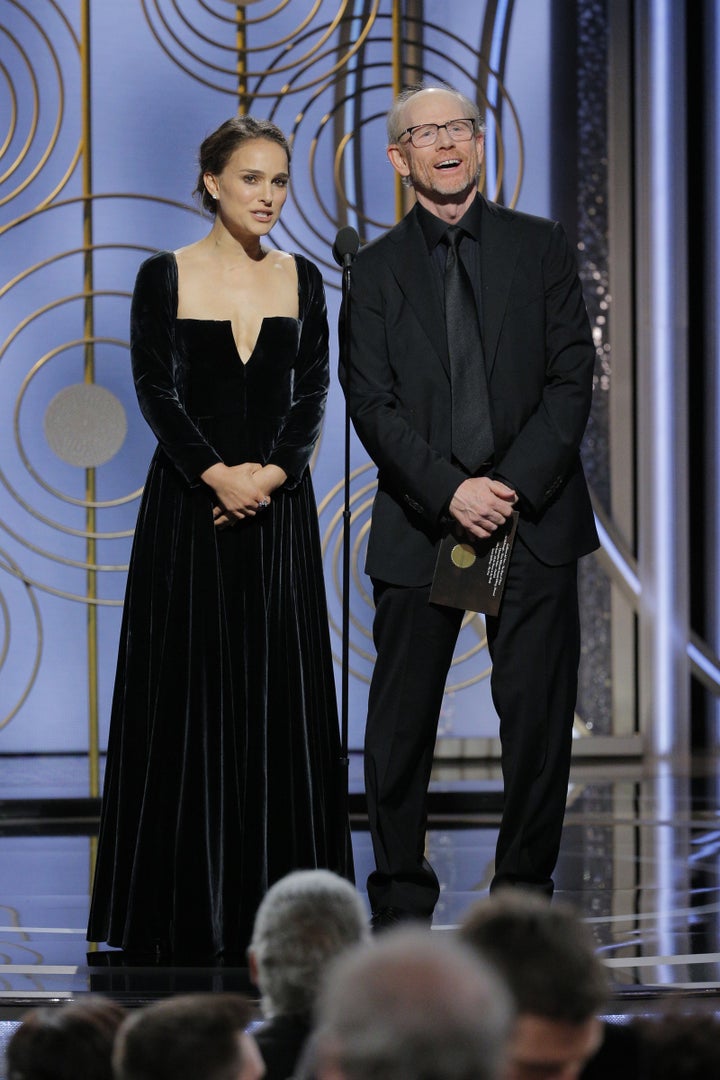
Portman and Ron Howard onstage Golden Globe Awards on January 7, 2018 in Beverly Hills, California.
Getty Images
Read more February 20, 2018 at 09:51AM
from BuzzFeed - TVAndMovies
via IFTTT




No comments